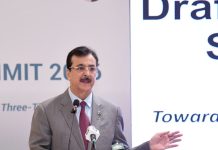Staff Report
ISLAMABAD: Minister of State for Information Technology and Telecommunication Shaza Fatima Khawaja on Tuesday said that the government would soon introduce the “One Patient, One Identity” system under the “Smart Islamabad” initiative in the Federal Capital.
Speaking to the media, she said that the system would help save a patient’s entire medical record, which would be accessible across all hospitals operating in the Federal Capital, including basic health units.
“This will eliminate the need for patients to visit the hospital where they had initially received medical care. They can visit any hospital in the Federal Capital, and the doctors there will access their medical records using the identity issued under the ‘One Patient, One Identity’ system,” she added.
The minister further said that as part of the project all schools in Islamabad, including both rural and urban areas, would be centralized and provided with Internet connectivity, along with other resources to improve the quality of education.
“The Ministry of Education is actively collaborating with the Ministry of Information Technology on this initiative,” she added. Sahza Fatima said that the centralized education system would enhance the quality of education in the Capital without requiring additional resources.
As part of the programme, she said that separate police facilitation centers would also be established across the city to serve the public. The Inspector General of Police Islamabad was actively working on the project.
“These centers will refer complaints to the relevant police stations for resolution. Currently, one center is operational, and work on four more is in progress,” she added.
The minister said that the Capital Development Authority (CDA) was also contributing to the project, which would soon provide the residents of Islamabad access to 150 services, including document attestation, certificate issuance, and token tax payments.
Islamabad, she said, would serve as the pilot project for the initiative, “which aligns with Prime Minister Shehbaz Sharif’s vision of digitalization. The broader plan for digital smart cities has already been presented to the prime minister, and the Federal Government is working with the provinces to advance digitalization efforts nationwide.”
Shaza Fatima said Pakistan had edged higher by 14 positions from rank 150 to 136 in the United Nations E-Government Development Index (EGDI) 2024.
“We are now proudly in the High EGDI category, reflecting our growing strength in e-governance and digital innovation,” she added.
The minister also highlighted Pakistan’s ranking in the Global Cybersecurity Index (GCI) 2024, where the country had been placed in Tier-1 (Role-Modeling) alongside global leaders such as the United States, Japan, Singapore, Australia, and Saudi Arabia. “With a score of 96.7%, this achievement reflects the progress made through collective efforts in cybersecurity, including initiatives like the NCSP-2021, CERT, Cybersecurity Regulations (PTA, NEPRA, SBP) Rules 2023, and Hackathons.”
The Ministry of IT & Telecom (MoITT), she added, was committed to fostering an environment conducive to innovation, business growth, and digital transformation.
“The National Incubation Centers (NICs) are supporting 1,300 startups across the country, helping them succeed in a competitive global market. The government has also launched a four-year plan offering over 109,000 training opportunities in advanced skills to prepare the youth for success in the global IT sector,” she added.
Shaza Fatima mentioned that the digitization of the Supreme Court and the Digital Economy Enhancement Project, a World Bank-funded initiative, was underway. “This project aims to develop a unified digital government framework to improve governance, transparency, and access to public services.”
“We have made significant progress in spectrum management, with 585 MHz now available for cellular services. The upcoming 5G spectrum auction, expected in early 2025, will drive further growth, supported by policies such as the National Fiberization Policy, Spectrum Sharing, and Re-Farming Framework.”
When asked about the slow Internet connectivity, she explained that Pakistan currently operated with 274 MHz of spectrum, while 550 MHz had recently been freed from litigation over the past six months.
She credited the Prime Minister and the Special Investment Facilitation Council (SIFC) for their roles in resolving the issues. She added that the lack of reinvestment and new equipment installation were additional factors contributing to slow Internet speeds.
The minister also said that the 5G auction had been delayed due to ongoing legal matters. Regarding the ‘Smart Phone for All’ initiative, she said that the final draft had been completed. The programme was initially proposed to Prime Minister Shehbaz Sharif during his presious tenure by the telecom sector.





